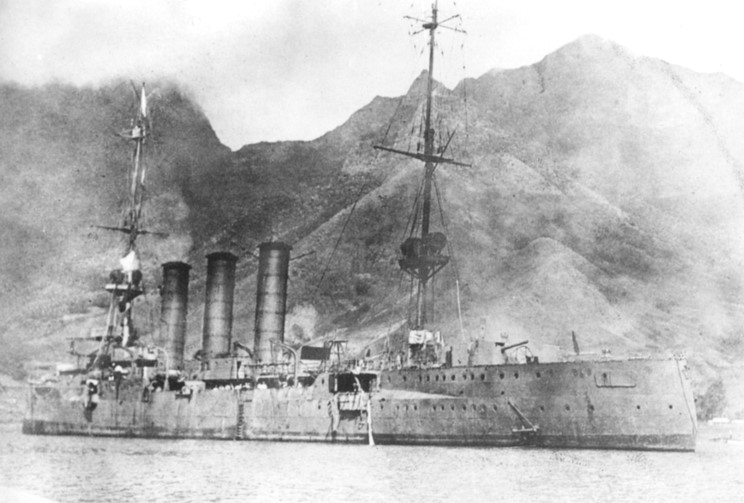|
During the Great War German warships ranged as far as Chile, one of these was SMS Dresden. This cruiser was well known to the British as she had claimed a number of British merchantmen during her raiding cruise. Dresden was involved in the Battle of Coronel and shells fired from her guns damaged the British cruiser HMS Glasgow. Surviving that battle Dresden was with Admiral von Spee at the Battle of the Falkland Islands where all of Spee's ships, save the Dresden, were lost. The only German survivor of the battle was in poor shape and low on coal and provisions, but Kapitän zur See Fritz Lüdecke kept his ship operational and fueled for a further three months, however he surmised that his ship would never see Germany again. In Feb. 1915 he was attempting to find a neutral country to have his ship and crew interned, he decided on Chile. On Mar. 8, 1915 he anchored at Cumberland Bay, Más a Tierra Island in the Juan Fernandez Archipelago, Chile, where the harbour master came aboard and instructed Lüdecke that Dresden must leave within 24 hours. Lüdecke informed him that this was impossible due to a lack of coal, he then requested that his ship and crew be interned and placed under the protection of Chile, this move was to keep his ship safe from attack by the British. There were no military installations on the island and the harbor master could not offer his assurance that Dresden would be unmolested. Lüdecke requested that a Chilean warship be sent to enforce international law of neutrality, but this would take several days. Lüdecke informed his superiors of his situation and intentions, including the possibility of scuttling his ship. He received approval for such an action on Mar. 9/10 when a signal from Germany was received stating that "His Majesty Kaiser Wilhelm II leaves you free to put your vessel out of commission". While the British were aware that Dresden was in the area, they did not know exactly where she was, they had been one step behind her for some time, but Dresden's own radio traffic gave them the information they needed. A signal sent to a coaling ship requesting a meeting on Mar. 9 and giving her location was intercepted by the British and decrypted. Captain John Luce, commanding officer of HMS Glasgow, requested assistance and two other ships came to his aid. On the morning of March 14, 1915 HMS Glasgow, HMS Kent and the auxiliary cruiser HMS Orama arrived at Cumberland Bay and opened fire on the sitting ship. Several hits were scored and fires broke out, the gunfire killed seven crewmen and soon the white flag of surrender was hoisted, but shells kept falling. An officer from Dresden was sent over to HMS Glasgow to protest the British attack on a German ship in neutral waters. The officer, Kapitänleutnant Wilhelm F. Canaris, was received on board and addressed Captain Luce. Canaris made a passionate protest to Luce claiming Dresden was in Chilean waters and therefore enjoyed the protection of a neutral country, he also stated that Dresden had been "provisionally interned", however Luce was unmoved by the argument. He told Canaris, "My orders are to destroy the Dresden wherever I find her. Other matters are not my concern--the diplomats will have to settle those later". The whole drama on the decks of Glasgow was a ruse by the Germans designed to give them time to prepare the ship for scuttling, and the ruse worked. While Canaris was on board Glasgow, Lüdecke had scuttling charges set and the seacocks opened, his crew were put ashore and shortly after Canaris returned SMS Dresden exploded and sank depriving the British of their prize. The Germans, except the wounded who were taken aboard the British cruisers, remained on the island for several days. They were picked up by two Chilean ships and taken to Quiriquina Island in the Bay of Concepción where they were interned. Over the course of time several men "escaped" including Canaris and one Oberleutnant zur See Kurt Hartwig, who later commanded SMS U-32 and SMS U-63 sinking HMS Cornwallis and 47 other ships totaling almost 150,00 tons. Canaris later commanded several U-boats, but without the success of Hartwig (4 ship sunk for 23,592 tons). While being a submarine commander may not have been his forté, he had other talents that were just as valuable to the Fatherland. In the Second World War Admiral Canaris would rise to be the top spy in Hitler's Germany as head of the Abwher. While not seeming to be a died in the wool Nazi, he served Hitler and the Reich for many years, albeit sometimes he did what he could to hinder his Führer which put him into some disfavor with Hitler. After a career that is an enigma, much like Canaris himself, he was removed from his position as head of the Abwher in Feb. 1944 and placed under house arrest. He was later implicated in the plot to assassinate Hitler (Operation Valkyrie) and finally executed on Apr. 9, 1945 at Flossenbürg concentration camp. |
© 2012 Michael W. Pocock MaritimeQuest.com |
 |
SMS Dresden seen just before her sinking. |
2005 Daily Event |
2007 Daily Event |
|
2011 Daily Event |